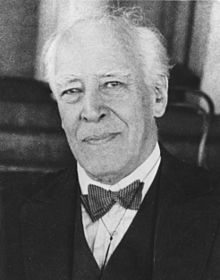The first act opens on a Sunday in April. Jimmy and Cliff are reading the Sunday papers while Alison is ironing in a corner of the room. Jimmy is a hot tempered young man and he begins to try and provoke both Cliff and Alison. He is antagonistic towards Cliff's working class background and makes fun of him for his low intelligence. Cliff is good natured and takes the antagonism. Jimmy attempts to provoke his wife, Alison, by making fun of her family and her well-heeled life before she married him. Jimmy also seems to display a nostalgia for England's powerful past. He notes that the world has entered a "dreary" American age, a fact he begrudgingly accepts. Alison tires of Jimmy's rants and begs for peace. This makes Jimmy more fevered in his insults. Cliff attempts to keep peace between the two and this leads to a playful scuffle between the two. Their wrestling ends up running into Alison, causing her to fall down. Jimmy is sorry for the incident, but Alison makes him leave the room.
After Jimmy leaves, Alison confides to Cliff that she is pregnant with Jimmy's child, though she has not yet told Jimmy. Cliff advises her to tell him, but when Cliff goes out and Jimmy re-enters the room, the two instead fall into an intimate game. Jimmy impersonates a stuffed bear and Alison impersonates a toy squirrel. Cliff returns to tell Alison that her old friend, Helena Charles, has called her on the phone. Alison leaves to take the call and returns with the news that Helena is coming to stay for a visit. Jimmy does not like Helena and goes into a rage in which he wishes that Alison would suffer in order to know what it means to be a real person. He curses her and wishes that she could have a child only to watch it die.
Cliff and Jimmy return to the flat and Helena tells them that she and Alison are leaving for church. Jimmy goes into an anti-religious rant and ends up insulting Alison's family once again. Helena becomes angry and Jimmy dares her to slap him on the face, warning her that he will slap her back. He tells her of how he watched his father die as a young man. His father had been injured fighting in the Spanish Civil War and had returned to England only to die shortly after. Alison and Helena begin to leave for church and Jimmy feels betrayed by his wife.
A phone call comes in for Jimmy and he leaves the room. Helena tells Alison that she has called Alison's father to come get her and take her away from this abusive home. Alison relents and says that she will go when her father picks her up the next day. When Jimmy returns, he tells Alison that Mrs. Tanner, Hugh's mother, has become sick and is going to die. Jimmy decides to visit her and he demands that Alison make a choice of whether to go with Helena or with him. Alison picks up her things and leaves for church and Jimmy collapses on the bed, heartbroken by his wife's decision.
The next evening Alison is packing and talking with her father, Colonel Redfern. The Colonel is a soft spoken man who realizes that he does not quite understand the love that exists between Jimmy and Alison. He admits that the actions of him and his wife are partly to blame for their split. The Colonel was an officer in the British military and served in India and he is nostalgic for his time there. He considers his service to be some of the best years of his life. Alison observes that her father is hurt because the present is not the past and that Jimmy is hurt because he feels the present is only the past. Alison begins to pack her toy squirrel, but then she decides not to do so.
Helena and Cliff soon enter the scene. Alison leaves a letter for Jimmy explaining why she has left and she gives it to Cliff. After Alison leaves, Cliff becomes angry and gives the letter to Helena, blaming her for the situation. Jimmy returns, bewildered that he was almost hit by Colonel Redfern's car and that Cliff pretended not to see him when he was walking by on the street. He reads Alison's letter and becomes very angry. Helena tells him that Alison is pregnant, but Jimmy tells her that he does not care. He insults Helena and she slaps him, then passionately kisses him.
Several months pass and the third act opens with Jimmy and Cliff once again reading the Sunday papers while Helena stands in the corner ironing. Jimmy and Cliff still engage in their angry banter and Helena's religious tendencies have taken the brunt of Jimmy's punishment. Jimmy and Cliff perform scenes from musicals and comedy shows but when Helena leaves, Cliff notes that things do not feel the same with her here. Cliff then tells Jimmy that he wants to move out of the apartment. Jimmy takes the news calmly and tells him that he has been a loyal friend and is worth more than any woman. When Helena returns, the three plan to go out. Alison suddenly enters.
When Helena leaves, Jimmy attempts to once again become angry but Alison tells him that she has now gone through the emotional and physical suffering that he has always wanted her to feel. He realizes that she has suffered greatly, has become like him, and becomes softer and more tender towards her. The play ends with Jimmy and Alison embracing, once again playing their game of bear and squirrel."












